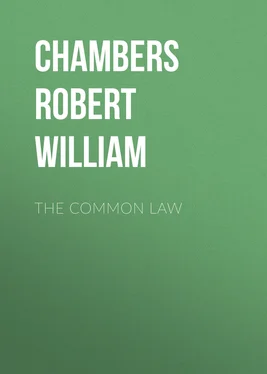Robert Chambers - The Common Law
Здесь есть возможность читать онлайн «Robert Chambers - The Common Law» — ознакомительный отрывок электронной книги совершенно бесплатно, а после прочтения отрывка купить полную версию. В некоторых случаях можно слушать аудио, скачать через торрент в формате fb2 и присутствует краткое содержание. Жанр: foreign_prose, foreign_antique, на английском языке. Описание произведения, (предисловие) а так же отзывы посетителей доступны на портале библиотеки ЛибКат.
- Название:The Common Law
- Автор:
- Жанр:
- Год:неизвестен
- ISBN:нет данных
- Рейтинг книги:4 / 5. Голосов: 1
-
Избранное:Добавить в избранное
- Отзывы:
-
Ваша оценка:
- 80
- 1
- 2
- 3
- 4
- 5
The Common Law: краткое содержание, описание и аннотация
Предлагаем к чтению аннотацию, описание, краткое содержание или предисловие (зависит от того, что написал сам автор книги «The Common Law»). Если вы не нашли необходимую информацию о книге — напишите в комментариях, мы постараемся отыскать её.
The Common Law — читать онлайн ознакомительный отрывок
Ниже представлен текст книги, разбитый по страницам. Система сохранения места последней прочитанной страницы, позволяет с удобством читать онлайн бесплатно книгу «The Common Law», без необходимости каждый раз заново искать на чём Вы остановились. Поставьте закладку, и сможете в любой момент перейти на страницу, на которой закончили чтение.
Интервал:
Закладка:
"You silly child," retorted Rita, "I'm twenty-two. Do you think I have the audacity to pretend I've never been in love?"
Ogilvy said with a grin: "How about you, Miss West?"—hoping to embarrass her; but she only smiled gaily and continued to play a light accompaniment to the fugitive air that was running through her head.
"Don't be selfish with your experiences," urged Ogilvy. "Come on, Miss West! 'Raus mit 'em!'"
"What do you wish me to say, Sam?"
"That you've been in love several times."
"But I haven't."
"Not once?"
Her lowered face was still smiling, as her pliant fingers drifted into Grieg's "Spring Song."
"Not one pretty amourette to cheer those twenty-one years of yours?" insisted Ogilvy.
But his only answer was her lowered head and the faint smile edging her lips, and the "Spring Song," low, clear, exquisitely persistent in the hush.
When the last note died out in the stillness Rita emphasised the finish with the ferrule of her parasol and rose with decision:
"I require several new frocks," she said, "and how am I to acquire them unless I pose for somebody? Good-bye, Mr. Neville—bye-bye! Sam—good-bye, Mr. Annan—good-bye, dear,"—to Valerie—"if you've nothing better on hand drop in this evening. I've a duck of a new hat."
The girl nodded, and, as Rita Tevis walked out, turning up her nose at Ogilvy who opened the door for her, Valerie glanced up over her shoulder at Neville:
"I don't believe you are going to need me to-day after all, are you?" she asked.
"No," he said, absently. "I've a lot of things to do. You needn't stay, Miss West."
"Now will you be good!" said Annan, smiling at her with his humourous, bantering air. And to his surprise and discomfiture he saw the least trace of annoyance in her dark eyes.
"Come up to the studio and have a julep," he said with hasty cordiality. "And suppose we dine together at Arrowhead—if you've nothing else on hand—"
She shook her head—the movement was scarcely perceptible. The smile had returned to her lips.
"Won't you, Miss West?"
"Isn't it like you to ask me when you heard Rita's invitation? You're a fraud, Mr. Annan."
"Are you going to sit in that boarding-house parlour and examine Rita's new bonnet all this glorious evening?"
She laughed: "Is there any man on earth who can prophesy what any woman on earth is likely to do? If you can, please begin."
Ogilvy, hands clasped behind him, balancing alternately on heels and toes, stood regarding Neville's work. Annan looked up, too, watching Neville where he stood on the scaffolding, busy as always, with the only recreation he cared anything for—work.
"I wish to Heaven I were infected with the bacillus of industry," broke out Ogilvy. "I never come into this place but I see Kelly busily doing something."
"You're an inhuman sort of brute, Kelly!" added Annan. "What do you work that way for—money? If I had my way I'd spend three quarters of my time shooting and fishing and one quarter painting—and I'm as devotedly stuck on art as any healthy man ought to be."
"Art's a bum mistress if she makes you hustle like that!" commented Ogilvy. "Shake her, Kelly. She's a wampire mit a sarpint's tongue!"
"The worst of Kelly is that he'd rather paint," said Annan, hopelessly. "It's sufficient to sicken the proverbial cat."
"Get a machine and take us all out to Woodmanston?" suggested Ogilvy.
"It's a bee—u—tiful day, dearie!"
"Get out of here!" retorted Neville, painting composedly.
"Your industry saddens us," insisted Annan. "It's only in mediocrity that you encounter industry. Genius frivols; talent takes numerous vacations on itself—"
"And at its own expense," added Valerie, demurely. "I knew a man who couldn't finish his 'Spring Academy' in time: and he had all winter to finish it. But he didn't. Did you ever hear about that man, Sam?"
"Me," said Ogilvy, bowing with hand on heart. "And with that cruel jab from you —false fair one—I'll continue heavenward in the elevator. Come on, Harry."
Annan took an elaborate farewell of Valerie which she met in the same mock-serious manner; then she waved a gay and dainty adieu to Ogilvy, and reseated herself after their departure. But this time she settled down into a great armchair facing Neville and his canvas, and lay back extending her arms and resting the back of her head on the cushions.
Whether or not Neville was conscious of her presence below she could not determine, so preoccupied did he appear to be with the work in hand. She lay there in the pleasant, mellow light of the great windows, watching him, at first intently, then, soothed by the soft spring wind that fitfully stirred the hair at her temples, she relaxed her attention, idly contented, happy without any particular reason.
Now and then a pigeon flashed by the windows, sheering away high above the sunlit city. Once, wind-caught, or wandering into unaccustomed heights, high in the blue a white butterfly glimmered, still mounting to infinite altitudes, fluttering, breeze-blown, a silvery speck adrift.
"Like a poor soul aspiring," she thought listlessly, watching with dark eyes over which the lids dropped lazily at moments, only to lift again as her gaze reverted to the man above.
She thought about him, too; she usually did—about his niceness to her, his never-to-be-forgotten kindness; her own gratitude to him for her never-to-be-forgotten initiation.
It seemed scarcely possible that two months had passed since her novitiate—that two months ago she still knew nothing of the people, the friendships, the interest, the surcease from loneliness and hopeless apathy, that these new conditions had brought to her.
Had she known Louis Neville only two months? Did all this new buoyancy date from two short months' experience—this quickened interest in life, this happy development of intelligence so long starved, this unfolding of youth in the atmosphere of youth? She found it difficult to realise, lying there so contentedly, so happily, following, with an interest and appreciation always developing, the progress of the work.
Already, to herself, she could interpret much that she saw in this new world. Cant phrases, bits of studio lore, artists' patter, their ways of looking at things, their manners of expression, their mannerisms, their little vanities, their ideas, ideals, aspirations, were fast becoming familiar to her. Also she was beginning to notice and secretly to reflect on their generic characteristics—their profoundly serious convictions concerning themselves and their art modified by surface individualities; their composite lack of humour—exceptions like Ogilvy and Annan, and even Neville only proving the rule; their simplicity, running the entire gamut from candour to stupidity; their patience which was half courage, half a capacity for suffering; and, in the latter, more woman-like than like a man.
Simplicity, courage, lack of humour—those appeared to be the fundamentals characterising the ensemble—supplemented by the extremes of restless intelligence and grim conservatism.
And the whole fabric seemed to be founded not on industry but on impulse born of sentiment. In this new, busy, inspiring, delightful world logic became a synthesis erected upon some inceptive absurdity, carried solemnly to a picturesque and erroneous conclusion.
She had been aware, in stage folk, of the tendency to sentimental impulse; and she again discovered it in this new world, in a form slightly modified by the higher average of reasoning power. In both professions the heart played the dominant part in creator and creation. The exceptions to the rule were the few in either profession who might be called distinguished.
Neville had once said to her: "Nothing that amounts to anything in art is ever done accidentally or merely because the person who creates it loves to do it."
Читать дальшеИнтервал:
Закладка:
Похожие книги на «The Common Law»
Представляем Вашему вниманию похожие книги на «The Common Law» списком для выбора. Мы отобрали схожую по названию и смыслу литературу в надежде предоставить читателям больше вариантов отыскать новые, интересные, ещё непрочитанные произведения.
Обсуждение, отзывы о книге «The Common Law» и просто собственные мнения читателей. Оставьте ваши комментарии, напишите, что Вы думаете о произведении, его смысле или главных героях. Укажите что конкретно понравилось, а что нет, и почему Вы так считаете.












